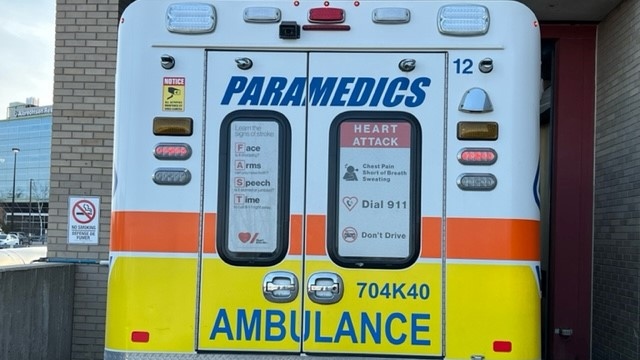New campaign launched to teach Manitobans about heart attacks
 An ambulance with the new campaign Dial Don't Drive. June 22, 2022. (Source: Dr. Shuangbo Liu)
An ambulance with the new campaign Dial Don't Drive. June 22, 2022. (Source: Dr. Shuangbo Liu)
A local doctor has launched a new campaign to tell Manitobans what to do if they are having a heart attack and the symptoms to be aware of.
Dr. Shuangbo Liu, who is an interventional cardiologist, said half of Manitobans having a cardiac episode call 911, while the other half drive themselves to the emergency room.
Liu also noted half of heart attack patients also wait two hours before seeking medical attention.
“When the artery is 100 per cent blocked, blood is not getting through and the muscle, the cells are dying. So for every minute that artery remains blocked, the chance of having a larger heart attack, more damage and worse quality of life increases,” said Liu.
To help teach Manitobans, she has launched an educational campaign called Dial Don’t Drive.
The idea is to teach and empower Manitobans to recognize heart attack symptoms, introduce cardiac staff and tell stories of survival to as many people as possible.
“This is not what I imagined I would be doing with my research or my career – making Instagram reels and TikTok videos.”
Patti LeBlanc is one person who experienced a heart attack six years ago.
She said her first symptoms were shortness of breath and chin pain. It wasn’t until her left arm started to tingle that she recognized it might be her heart.
“I got in my car and phoned my husband, asked him to call 911 because something was wrong. I thought I was having a heart attack and proceeded to drive home,” said LeBlanc.
Since her recovery, LeBlanc said she has started to run again and she also tells everyone the importance of having paramedics come to you, instead of the other way around.
“Time is so important with healthcare, but so much with cardiac care time is important,” she said.
Liu said there are three symptoms to remember – sweating, chest pain and shortness of breath.
“I think there is a lot of fear, there is a lot of uncertainty and some people just don’t have that knowledge and we’re here to change that.”
More information about the Dial Don’t Drive campaign can be found online.
CTVNews.ca Top Stories

BREAKING Donald Trump picks former U.S. congressman Pete Hoekstra as ambassador to Canada
U.S. president-elect Donald Trump has nominated former diplomat and U.S. congressman Pete Hoekstra to be the American ambassador to Canada.
Genetic evidence backs up COVID-19 origin theory that pandemic started in seafood market
A group of researchers say they have more evidence to suggest the COVID-19 pandemic started in a Chinese seafood market where it spread from infected animals to humans. The evidence is laid out in a recent study published in Cell, a scientific journal, nearly five years after the first known COVID-19 outbreak.
This is how much money you need to make to buy a house in Canada's largest cities
The average salary needed to buy a home keeps inching down in cities across Canada, according to the latest data.
'My two daughters were sleeping': London Ont. family in shock after their home riddled with gunfire
A London father and son they’re shocked and confused after their home was riddled with bullets while young children were sleeping inside.
Smuggler arrested with 300 tarantulas strapped to his body
Police in Peru have arrested a man caught trying to leave the country with 320 tarantulas, 110 centipedes and nine bullet ants strapped to his body.
Boissonnault out of cabinet to 'focus on clearing the allegations,' Trudeau announces
Prime Minister Justin Trudeau has announced embattled minister Randy Boissonnault is out of cabinet.
Baby dies after being reported missing in midtown Toronto: police
A four-month-old baby is dead after what Toronto police are calling a “suspicious incident” at a Toronto Community Housing building in the city’s midtown area on Wednesday afternoon.
Sask. woman who refused to provide breath sample did not break the law, court finds
A Saskatchewan woman who refused to provide a breath sample after being stopped by police in Regina did not break the law – as the officer's request was deemed not lawful given the circumstances.
Parole board reverses decision and will allow families of Paul Bernardo's victims to attend upcoming parole hearing in person
The families of the victims of Paul Bernardo will be allowed to attend the serial killer’s upcoming parole hearing in person, the Parole Board of Canada (PBC) says.


































